Sarahbeth Caplin's Blog, page 36
March 24, 2016
Let’s talk about hell!
My last post was about “redemptive justice”: the idea that punishment must teach the offender something, or else it doesn’t work. It’s why I’m against torture and capital punishment: you’re just not in a position to correct your behavior when you’re being harmed, and especially not when you’re dead.
That is why I can’t wrap my head around a loving god who consigns nonbelievers to a fate of burning for eternity.
That’s not to say I don’t believe there’s a hell (although that belief is shaky at best). Yes, it’s a critical part of the “Christian package,” so my best answer is simply “I don’t know,” because honestly? I don’t like thinking about it. But it’s a, um, heated subject (forgive me), so I can’t afford to be neutral about it.
I don’t think God would force anyone to spend eternity with him if they don’t want to. But I’m not convinced that hell is a literal place of fire and brimstone, either. That conviction, too, is shaky, but I’m not alone in considering it. I’ve done thorough research over the last several months, with help from Gregory Boyd, Jon Sweeney, Benjamin Corey, and my Jewish annotated editions of the Old and New Testament (which I highly recommend).
I purposely selected a mix of conservative, progressive, and scholarly sources to avoid confirmation bias. With a topic like this, it would be easy to only seek out sources that are likely to confirm what I want to be true, but I’m too intellectually honest to be satisfied with that. I want the truth, no matter how disturbing it might be.
But after all that studying, I’m nowhere close to a definitive answer. I’ll be studying for the rest of my life and might not come to an answer, unless God himself shares it with me (unlikely). The best I can offer are educated guesses.
This is what we know about Gehenna, the hell that Jesus talks about: it refers to a garbage dump outside of Jerusalem, where pagans performed human sacrifices (hence the reference of “weeping and gnashing of teeth”). But more pertinent is the fact that eternal suffering isn’t mentioned anywhere in the Old Testament. Instead, we get references to annihilation: ceasing to exist, being snuffed out. That’s a fate reserved for the truly wicked and unrepentant. So at what point in history did this literal pit of fire come to be? Sin comes into the picture in the first book of the Bible, so it would have to have always been there. But the Hebrew Scriptures never mention it.
Those are logical appeals to a different definition of hell, but my biggest concern is the justice angle. Punishment, by definition, is corrective. Our justice system only implements life sentences or the death penalty when criminals are deemed too dangerous to be released back into society. With eternal life, there’s certainly ample time to be corrected and restored. So you’d think.
Blogger Benjamin Corey really put a dent in my thinking when he wrote a post about the Jordanian pilot who was burned alive by ISIS. Most of the world was appropriately horrified by this extreme barbaric act. But how many of those horrified people also believe in a god who permits that sentence to nonbelievers? Presumably, the pilot was a Muslim, and traditional Christianity would say he deserved that fate.

I believe we are sinners, but I just can’t believe that level of suffering is what we all deserve. When the Bible talks about “deserving hell,” I lean toward the idea that we don’t deserve God’s presence when our inclination is to choose sin instead. Isn’t that ultimately what hell is – separation from God?
Perhaps attempting to define “separation from God” is missing the point; I’m sure all Christians can agree that this separation is not a good thing. But using hell as a scare tactic to gain converts isn’t a good thing, either, when it so horribly contradicts the idea that “Perfect love casts out all fear” (1 John 4:18). During the Spanish Inquisition, thousands of Jews chose conversion over burning at the stake, and I don’t blame them one bit. But how genuine were these conversions, really?
I have to believe that a God of love has better ways of drawing people to him. That has to be my final answer, no matter what: that God is love, that God is just, and (to quote Jon Hollingsworth) if his grace is as big as people say it is, then we have good reason to be optimistic about eternity.
Filed under: Religion Tagged: Christian culture, Christianity, evangelicals, hell, Judaism








March 23, 2016
The problem with vindictive justice
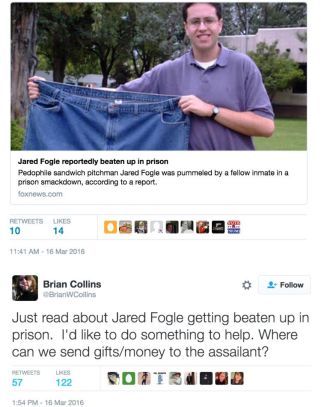 My friend Sarah Morehead wrote a very moving, personal post about how vilifying sex offenders actually encourages further abuse:
My friend Sarah Morehead wrote a very moving, personal post about how vilifying sex offenders actually encourages further abuse:
Put away your pitchforks for a minute and hear me out. We’ve all seen it happen and maybe even participated in the diatribe ourselves. A convicted sex offender is sentenced and the shouts of “Monster!” and “You deserve what you’ll get in prison!” (and worse) erupt from our networks.
Just yesterday, we learned that Jared Fogle (former spokesman for Subway) was assaulted in prison, where he’s serving time for possessing child pornography and engaging in “commercial sex acts with underage minors,” as the government filing put it. My friends (theists and atheists alike, incidentally) gleefully cheered the “justice” and “karma being served.”
I know this vindictive feeling well. The last words I said to my abuser were “You’re dead to me” over the phone as we were breaking up and he kept repeating, “I’m sorry you got hurt,” which is the worst not-pology I’ve ever heard. Not “I’m sorry I hurt you,” but “I’m sorry you feel hurt,” once again shifting the blame on me for reacting appropriately to what I later learned was coercive manipulation. He was so good at it, I didn’t realize what was happening. My eyes slowly started to open as friends confronted me to tell me what they saw from the outside. Looking back on it now, I can’t believe how blind I was. I cringe at the thought that I was a “victim” for so long – five years.
So yes, I know the feeling of wanting violent, vindictive justice. I wanted him to know exactly what I felt when he told me “Trust me, you’ll like it, you’ll change your mind, this won’t hurt.” I wanted him to know what it felt like when I realized he lied. And he wouldn’t stop.
I don’t wish for that anymore.
Now, I’d wager most folks on my News Feed consider themselves to be “good people,” and I’d agree with most of them. And I, for one, don’t think anyone deserves to be assaulted or the victim of violence whether they’re “good people” or not. Our hearts break for any victim of sexual assault — and when it’s a child, or children, we want to circle our wagons and do our best to protect them. But does advocating vigilante justice help or hurt children in the long run? In a public post on my Facebook page, and similar posts on friends walls, I explained my problems with this reaction. In short, we were countering one form of violence with another, and we were creating a warped profile of child predators.
Sarah has more than earned the right to speak with knowledge on this subject. She endured a parent’s worst nightmare when abuse happened to one of her own children.
I had, and still have, moments of indescribable grief, sadness, anger, and a myriad other awful emotions that creep in when you’re alone with your thoughts at 3:00 a.m. It will take years of coping, adjusting, and grieving for me and my children to come to grips with the magnitude of what had happened. I’m relieved that the truth is out. But it’s not easy, and I don’t know when, or even if, I will ever be able to manage forgiveness.
But I don’t have a “let’s love and respect the predator” attitude either. I don’t. Nor would I ask anyone to forgive their (or their children’s) abuser. I can’t. I won’t. We can embrace our emotions while simultaneously condemning violence as retribution. When we justify violence for the sake of catharsis, we are reacting on a level that is no different than the rationale of the abusers themselves: I couldn’t stop myself… I was overcome with emotion…
I reject the notion that reactionary violence is justified. I can be angry and I have every right to my feelings. Yet I am responsible for putting forth a rational approach to dealing with sex offenders. It’s not just for their sake. It’s for the sake of their victims — and potential victims in the future.
It’s taken years of therapy for me to arrive at this place myself. My personal research on the cycle of abuse has been quite eye-opening: many abusers have endured abuse themselves in some way. Was that the case with my abuser? I don’t know. But somewhere in the course of his life, he picked up the harmful idea that wearing a woman down with “Don’t you love me?” and “I bought you a nice dinner, you owe me” until she finally says “yes” counts as consent. Somehow, he bought into the lie that it’s okay to ignore her “no” if you’ve had consensual relations before.
Somewhere in the long journey of healing, I stopped hating Jason and started feeling sorry for him. I’m still upset with myself for never pressing charges when I had the chance, but ultimately I’m just sad about the whole thing. I don’t want to see him humiliated, tortured, or hurt in any other way. I want him held accountable. I want him to get the help he so desperately needs, so the cycle doesn’t repeat itself. I don’t want any more women to get hurt.
I still have bad days. I haven’t completely gotten over the anger, and don’t know if I ever will. But for me, redemptive justice looks like channeling that anger into activism, which is why I’m participating in a school production of “The ____ Monologues” (inspired by “The Vagina Monologues,” but it’s mostly original pieces by students).
Breaking an already broken person wouldn’t teach him anything. Using violence as justice satisfies a blood lust, and where does it end? How much suffering would have to happen in order for justice to be considered “served”? More to the point, what does suffering actually teach the perpetrator? Ideally, it would be empathy, but somehow I doubt that. At some point, the suffering becomes meaningless, and there’s no redemption in that.
If the punishment isn’t redemptive, then it isn’t justice.
Filed under: Rape Culture Tagged: Controversy, grief, rape culture, self-care, social justice








March 20, 2016
A day in the life of a person with OCD (Guest post)
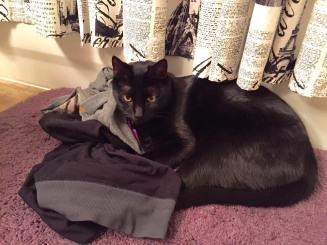 I’m standing in front of my closet, contemplating which outfits to plan for the week. This saves me time in the morning when I inevitably spend an extra half hour snuggling the cat in bed after my snooze button goes off three times.
I’m standing in front of my closet, contemplating which outfits to plan for the week. This saves me time in the morning when I inevitably spend an extra half hour snuggling the cat in bed after my snooze button goes off three times.
A sweatshirt would be ideal for today since it’s still in the 40s, except all the sweatshirts have been worn more times than the long-sleeved Gap shirts that pair with scarves, and have all the scarves been worn an equal amount of times before being put away for the season? Maybe I should wear one of those instead…
The average woman might stare at her full closet and feel excited by all her choices, but when it comes to wardrobe, too many options overwhelm me. I have to wear each item an equal number of times per season or I can’t keep it. The thought of holding on to things I don’t use is distressing. If months go by and it hasn’t been worn, it goes into the Goodwill pile.
My husband lightheartedly tolerates my Goodwill binges, but gets irritated if I contemplate giving something away without asking him. Those dress shirts in the back of the closet he hasn’t worn in all six years I’ve known him? “I might need them someday.” Someday?! That makes no sense to me at all.
In the last several weeks I’ve donated half a dozen grocery bags of clothes, because I’m a slave to Out of Print and buying a new item means giving away an old one. It’s the Rules. I can’t buy anything new without doing a full closet inventory first to see how a new item will fit.
Read the rest here.
Filed under: Other stuff Tagged: Author Sarahbeth Caplin, depression, grief, OCD, self-care








March 14, 2016
Living on the fringe of faith
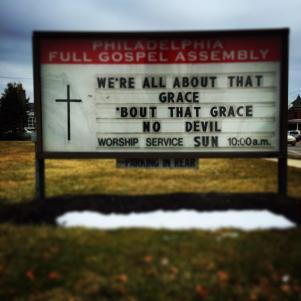 If I look back on my life from a psychologist’s perspective, it makes sense why Christianity appealed to me so much. The person with OCD likes everything neatly arranged and in impeccable order (at least this person does). From the outside looking in, Christianity seemed to fit this bill with its clear definitions of right and wrong, moral and immoral, holy and unholy.
If I look back on my life from a psychologist’s perspective, it makes sense why Christianity appealed to me so much. The person with OCD likes everything neatly arranged and in impeccable order (at least this person does). From the outside looking in, Christianity seemed to fit this bill with its clear definitions of right and wrong, moral and immoral, holy and unholy.
It’s not so much that I agreed with everything most denominations have in common, so much as I admired the organization of doctrines. Judaism by comparison (Reform Judaism, obviously) allowed far too much room for making up my own mind about things, and that, to me, was its fatal flaw.
Well, the joke is on me now, isn’t it? I had no idea that churches have split, and continue to split, over doctrinal disagreements. The black and white ideas I thought were so clear are actually anything but, depending on the subject. Needless to say, this is all very frustrating for someone who thought she was signing up for a religion of easy answers.
The most adamant teaching from my college ministry was the necessity of having an answer for what we believe and why, per the instructions of 1 Peter 3:15: “Always have an answer ready for the hope you have in Christ.” Because we never knew when a crazed gunman might come to campus and attempt to make us martyrs, like what supposedly happened at Columbine (what do you expect from a group that calls itself Campus Crusade, after all?).
Except no one got martyred while I was in college. Instead, students claimed to be asked from time to time, “Why are you always so happy? What’s your secret?” And that would be the platform for witnessing.
Well, few people would ever look at me and think, “Gosh, isn’t she happy!” so I don’t think that tactic works for me. I can’t remember a time I’ve ever had anyone randomly come up to me and ask about my “secret” for which Jesus would be the answer. Actually, the only people who have ever gotten in my face to ask about my beliefs were street preachers, the angry kind who just want an excuse to tell me why I’m wrong and that I’m going to hell. And then a radical thought occurred to me…
This pressure I feel to have answers, to know exactly which box represents my beliefs so I can put a check mark next to it, now mostly comes from me. Reality doesn’t actually work that way. I don’t owe anyone an explanation of my faith journey and the shaky place I find myself now. That story is much better explained with a friend over coffee, in which the goal is to share our struggles and understand each other, because that’s how relationships work. And I think this is why I’m able to have friendships with people who aren’t Christian, because admitting “I don’t know” comes much easier to me than “This is why I’m right.”
Still, the Bible itself continues to be a source of pressure for me. It claims you’re either “on fire” for God or “lukewarm” and will be spit right out. You’re either for Jesus, or against him. You’re a True Christian, or you’re lost. For all the narratives and parables about men and women who emulated the paradox of faith and doubt, there’s plenty more that keeps me up at night, praying for grace and humility for all the things I could be wrong about.
I’ve met Christians who are absolutely confident that hell is not a literal place; that Jesus is one of many paths to God. My own belief insecurities are too great for me to condemn anyone who strays from Orthodox teachings. More than that, deep down I hope those beliefs are right, even if I never confess them with confidence. Perhaps it would be easier to reject the things I don’t like, but I feel safer by living on the fringes, where grace and humility are clearer to me than ever before. For now, this is the safest place for me to be. It’s messy, it’s sloppy, it’s anything but organized, and drives my OCD crazy. But I’m learning to make it a home.
Filed under: Religion Tagged: Campus Crusade for Christ, Christian culture, Christianity, evangelicals, hell, Judaism








March 12, 2016
Anatomy of the naked selfie
I highly doubt that Kim Kardashian posts nude selfies on Instagram for the purpose of feminist discourse, but this person seems to think so. I can’t tell if it’s purposely tongue-in-cheek, or if it takes a nude selfie with the caption “I have nothing to wear, lol” a bit too seriously. My guess would be the latter, but it still got me thinking.
Most of us have seen these before: the anti fat shaming selfie of a woman in a dressing room posing in a bikini; the “no makeup” selfie trend. I don’t think there’s anything inherently wrong with these, especially if the purpose is to inspire other women to be comfortable in their skin and make peace with so-called “body flaws.” At the same time, if the confidence is truly genuine, I wonder why there’s a need to share these photos at all…especially the naked ones.
I shake my head at some of these “pride selfies” for the same reason I shake my head at the posts bragging about how incredible one’s spouse or boyfriend is, how happy and perfect and #blessed the marriage/relationship is. Yes, sometimes the reason I want to hide these posts is out of jealousy. But seriously, consider this: is it possible that the truly happy, satisfied, confident people don’t need to post about it? I might believe this more if the ‘like’ and comment features were turned off, cancelling all expectations of compliment showers.
Keep in mind this is pure speculation, not a judgment against every woman who has shared provocative images on social media. Only she can know her true motives. I think the real target of my increased jadedness is the society so obsessed with body criticism that makes these photos necessary. That, and the sad fact that naked or barely-dressed women sell more beer, clothes, cars, music, you name it than clothed women do.
There were many comments on the aforementioned xoJane piece shaming women in general for “attention-whoring” themselves by exposing their nudity, but I have to say that this particular comment sums up my feelings on the matter:
I just want to know how come the primary way women seem to get popular/known/etc is by getting naked. I’d like to see a world where a woman who prefers to keep her clothes on can be as successful. I don’t fault her for owning her body and her sexuality, I don’t care about her sex tape, and I don’t care how many nude selfies she wants to post. However, there comes a point where I think female celebrities who make these choices also need to start calling out the fact that objectification is bullshit, and women shouldn’t have to take their clothes off to get attention.
I think the operative words there are “She shouldn’t have to.” But if she wants to, then it’s not my business. And there are plenty of ways to politely disagree with this kind of exhibitionism without resorting to slut shaming.
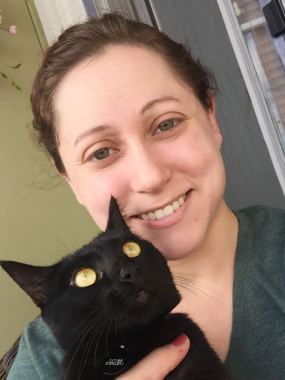
If you look at my social media accounts, this is the typical selfie you’ll see. Catniss is quite photogenic, don’t you think?
Filed under: Feminism, Other stuff Tagged: Controversy, Facebook, Feminism, Kim Kardashian, self-care








March 9, 2016
Rape trauma and the evangelicals who still don’t get it
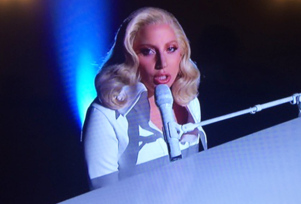 You might find this surprising, but I sometimes read Focus on the Family’s entertainment blog. I started reading it years ago when I had more in common with their target audience, and I actually find it somewhat addicting. But, the movie reviews can be unexpectedly snarky, and I’m very much in agreement with the writers that sexuality is exploited by Hollywood far too often.
You might find this surprising, but I sometimes read Focus on the Family’s entertainment blog. I started reading it years ago when I had more in common with their target audience, and I actually find it somewhat addicting. But, the movie reviews can be unexpectedly snarky, and I’m very much in agreement with the writers that sexuality is exploited by Hollywood far too often.
I realize I’m more left of center than the target audience now, but I’m responding to this blog post by Juli Slattery, founder of the women’s ministry “Authentic Intimacy,” because it represents an attitude seen far too often in Christian circles regarding the healing process of sexual abuse survivors.
The aforementioned post is a response to Lady Gaga’s gut-wrenching Oscar performance of “Till it Happens to You,” a song that rightly calls out those who judge and victim-blame by saying “You don’t know how it feels.” Before I heard that song, I wouldn’t have called myself a Gaga fan. For the most part, I still don’t. Her songs are a bit too dance-poppy for me, but if she produced more ballads like this, I’d definitely jump on her bandwagon.
As a survivor herself, Gaga performed this song with such moving intensity and emotion, making it difficult to criticize, but still Slattery did. The reason? It was too depressing. It lacked hope. More to the point, it didn’t mention Jesus as the ultimate healer at the end. But before she mentions that, she says this at the beginning, which comes across to me as a bit victim-blamey – quite unbecoming for someone in the counseling profession:
The tidal wave of sexual exploitation in our world will not subside until we recognize sexuality as a great spiritual battlefield. It is sadly ironic that the same people decrying sexual abuse create countless films that objectify women and present sexual pleasure as a commodity traded as freely as baseball cards. This cavalier and humanistic attitude toward sexuality, pornography, and the “hook up” culture are clearly propagating the tragedy highlighted in last night’s Oscars.
I’m shocked that the irony of this sailed right past Slattery. I’m not a fan of the “hook up” culture either, but what separates casual sex from rape should be rather obvious: consent. There is a world of difference between songs that celebrate sex between (let’s assume) consenting strangers and songs that encourage or make light of rape (I’m looking at you, Robin Thicke). A person who willingly has sex with one stranger is always within her right to refuse sex with another. I don’t understand why that’s so difficult to understand.
Now, back to the passage about Gaga’s song lacking hope:
While Lady Gaga’s song was bold and purposeful, it offered no hope. In fact, the message was that victims of sexual abuse suffer alone because no one can quite reach into their despair and brokenness.
Yes, that’s quite true. Again, to quote Gaga, “Till it happens to you, you don’t know how it feels.” That’s relevant to any tragedy. It’s not right, it’s not wrong; it’s just the way it is.
You know, I don’t need every song, book, or blog post about trauma to encourage me. I know where to look when I need that. Sometimes it’s nice to listen to someone who’s been where you are; who knows the pain you’re experiencing, and despite it all, ended up pretty damn successful.
We want to tell you clearly; you are not alone. Jesus is the God, who sees your pain, who hears your cries in the night, the God of all comfort, and the One who can bind up your broken heart. He can release you from the prison of your sin and the darkness of your shame.
Okay, back up. Really Slattery, you could have stopped after “bind up your broken heart.” As a Christian myself, I have no issue with this (I still believe that Jesus + therapy + anti-depressants is the best medicine, though). But what was the point of mentioning “prison of your sin”? Don’t you mean “the rapist’s sin”?
This is why, though I’ve had two great Christian counselors in the past, I am generally skeptical of “Christian counseling” as its own separate field. I’ve heard too many stories of Christian “counselors” who don’t seem willing to do the hard work of letting a client really feel and parse through their anger, because forgiveness is treated like a magic antidote that makes the pain disappear. And those who struggle with forgiveness, or perhaps aren’t ready to make that step, are accused of being “bitter,” a sin that’s just as bad as the rape itself.
Frankly, if anyone deserves grace for being bitter, it’s rape victims. That doesn’t mean it’s healthy. That doesn’t mean it shouldn’t be dealt with. For all her training, it doesn’t sound like Slattery is all too familiar with the psychology of abuse and its lasting effect on survivors, or else she’d show more sympathy for the fact that letting go of abuse takes WORK. Prayer, yes, but also a lot of work.
And even then, sometimes the best you can do is learn to manage the pain. Isn’t part of the Christian life about learning how to carry a cross? For some people, rape trauma and PTSD is that cross.
Lady Gaga, He has “been there.” Why did the God of the universe suffer abuse, ridicule and torture at the hands of human beings? So that He would be the “man of sorrows, acquainted with our grief,” identifying with us in our deepest pain.
This is like saying, “But not all Christians are like that!” when someone shares how Christians hurt them. The statement is technically true, but it’s condescending in its attempt to minimize the pain of the person speaking.
Let’s get one thing clear: Jesus suffered, yes, but he was never raped. That’s a whole different level of suffering.
Unfortunately, many Christians do not acknowledge God as the Healer of our sexual brokenness. The unspoken lie we believe is that sexuality is beyond God’s ability to heal, to redeem and to restore.
I think God sometimes doesn’t heal abuse survivors for the same reason he doesn’t heal some people of cancer. Well, actually, I don’t know the reason. But not all things can be healed, and we may never understand why until we meet God face to face. That’s not a “lie”; that’s reality. It’s flat out cruel to tell an abuse survivor that the validity of their faith depends on whether or not they make a full recovery from the trauma of rape. Would you dare say that to someone who survived a car accident? This is an act of violence that was forced on someone, and yet the burden of recovery falls on the victim? What the hell kind of psychology is that?
Good intentions aside, a “counselor” like Slattery has no business being in this field. Her “advice” is the very picture of spiritual abuse masked by a facade of holiness.
Filed under: Rape Culture, Religion Tagged: Christian culture, Christianity, depression, evangelicals, grief, Lady Gaga, rape culture, self-care, Spiritual Abuse








March 6, 2016
Hate the author’s worldview, but still like the book?
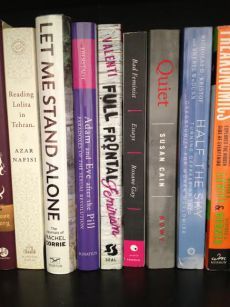
Moving my books from one location in another is a literal labor of love. I don’t know the exact number, but I’d say I own at least a couple hundred. In the first two years I lived in Colorado, I moved around four different times, and each time I condensed my shelves beforehand to make the process a little easier. But in order to determine which books stayed in the “Keep” pile and which got packed in the “Donate to used book store” pile, I had a lot of rereading to do. I’m hoping to buy my first home this year (!) so now the process repeats.
It’s pretty amazing how the same book can read completely differently after several years. In many cases, this is a good thing. I probably wasn’t mature enough to fully understand the depth of To Kill a Mockingbird when I read it in ninth grade. Rereading it a few months before the release of Go Set a Watchman was an eye-opening revelation of just how much I had missed; how much symbolism flew right over my head. Many of the classics I’ve reread have that effect on me.
Not Catcher in the Rye, though. Holden Caulfield is still the whiny little booger I thought he was when I read him in 11th grade, but I think I understand him a little better now. Aren’t we all the hypocrites we love to hate at times?
Then there are the books that rocked my world the first time I read them at ages fifteen through eighteen. Many are a sore disappointment to reread at twenty-seven. It’s worth noting that I was far more conservative as a teenager and in my early twenties, whereas today I’m a bit more moderate. I’m rather proud of myself for placing Adam and Eve After the Pill by Mary Eberhardt (a book for a Catholic audience) right next to Jessica Valenti’s Full-Frontal Feminism (definitely not intended for a conservative audience. Or maybe it is. But Valenti herself is far from that end of the spectrum). Fifty Women Every Christian Should Know also shares a shelf with Fifty Jewish Women Who Changed the World. I’m still proud of the diversity of thought that exists on my shelves. But rereading some of these books makes me uneasy to keep them, as if the space on my shelf represents endorsement.
Feminine Threads by Diana Lynn Severance, for example, is a book about Christian women from the time of Jesus until the twentieth century who left their mark on the church. It sounds like it should be good reading for a history buff and theology nerd…except Severance couldn’t educate me about these unknown and underrated women without slamming feminism as the reason everything is wrong in the church. There’s disagreeing with an author, and then there’s being so repulsed by an author’s refusal to even try to see things from the other side that makes me want to throw the book across the room.
It saddened me to put that one in the “Donate” pile. Adam and Eve went, too. Not sure what I was expecting with that one, but again, a book that misinterprets feminism and renders it incompatible with faith is just not a book for me. I should also note that Valenti’s book isn’t exactly kind to the conservative views of sex and contraceptives, but there’s something about her spunky tone that makes it not bother me as much. There are some circumstances in which it doesn’t bother me to be offended, because sometimes it’s the only thing that teaches you empathy for people on the other side of an issue.
Still, I feel a bit hypocritical about getting rid of those books. Can’t I enjoy some parts of the book while disagreeing other parts? To what extent do I have to share an author’s worldview in order to enjoy their work? If it entertains or educates me in some way, then what does it matter?
I don’t want to be someone who only reads books that support her already existing worldview. I like being challenged. But I don’t like being generalized and talked down to.
Now, Jesus Feminist by Sarah Bessey sits next to Valenti’s Full Frontal, which just makes me giggle.
Filed under: Feminism, Religion, Writing & Publishing Tagged: Christian culture, Christianity, Feminism, Writing








March 3, 2016
Discounted ebook – for a cause
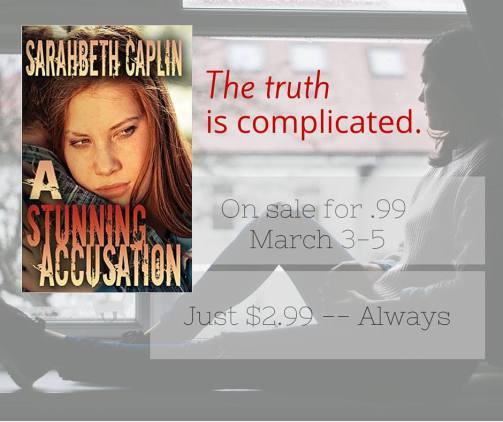
With all the publicity from Kesha’s rape allegations against her producer, it’s time to discount this book again, because not even judges in a court of law understand the reality of the “imperfect rape victim.”
The reality is, most rape victims are not perfectly chaste, unsullied damsels who suddenly lose their honor. They might drink or do drugs. They might have active sex lives with multiple partners. They might party and go home with the wrong person. More often than not, they might even be in intimate relationships with their assailants, or otherwise know them personally. None of this makes them deserving of assault.
We don’t typically shame people who have been mugged for carrying large purses. We don’t shame drivers hit by speeding drunks for being on the road in the first place. We don’t throw out allegations of burglary simply because the homeowner left his door unlocked. But rape is the only crime in which the victim is somehow at fault, rarely the rapist.
This book is a work of passion and grief because my rapist was never charged, but hopefully it’s also an entertaining and enlightening look at the most common forms of assault, why accusations are rarely taken seriously, and why they should be. Even if you don’t read the book, take a look at some of the reviews on Amazon. One book won’t save the world, but it seems to have influenced a few people, and that is the best kind of “royalty” I could ever receive.
You can download the book here.
Filed under: Feminism, Rape Culture, Writing & Publishing Tagged: Author Sarahbeth Caplin, Feminism, rape culture, Writing








March 2, 2016
Plagiarism, copyright infringement, and the rights of authors
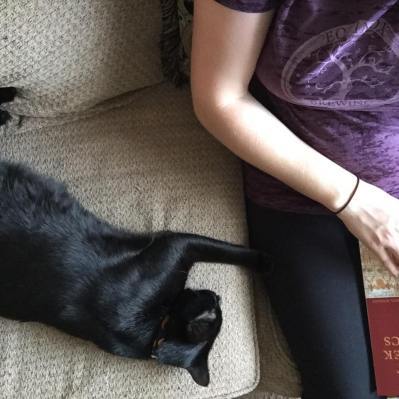
Catniss is far more concerned about stealing my attention than my ideas
The first edition of Confessions of a Prodigal Daughter contained a handful of quotes from authors whose books were influential in my spiritual journey. Some authors’ works were in the public domain, such as that Saint Augustine, but others, like Lauren Winner’s memoir Girl Meets God, were not. I hold a bachelor’s degree in English Literature and was certainly not ignorant of plagiarism: I cited each quote with the correct author and the work it was from, in MLA format, no less. What I didn’t know about was copyright infringement, which complicates the rights of authors and artists in ways I did not expect.
Unfortunately, I didn’t learn about the dangers of copyright infringement until after publication. I reasoned that the authors I quoted would never stumble upon my little self-published book; but that would mean I couldn’t promote it as much as I would like. What if the sister of a friend of the publisher of Winner’s book somehow got hold of it, and then came after me for not asking permission to use her quotes? Though Winner herself might be flattered (I hope) and have no problem with my attribution, ultimately the decision would not be up to her; she’d have to answer to her publisher, which holds the rights to her book.
The anxiety was too much; I ended up removing the book from the market (it had other issues besides improper use of quotes anyway, like never seeing the eyes of a proper editor. The second edition is the one worth reading!).
Now with the advent of social media and blogging, everyone is an author in their own right, and the rights of authors are much more complex. Is posting a screen shot of a tweet I did not originally publish a form of plagiarism? In fact, I can’t count the number of screen-shot Tweets I’ve seen shared on Facebook lately, in which users poke fun at Donald Trump and make quips about political hypocrisy. Did my Facebook friends request permission from the original Twitter users before sharing? Most likely not. Or does social media, emphasis on social, imply distribution to as wide an audience as possible?
I would assume the latter, but you never know. As an author, I’m possessive of my words, so I understand the potential controversy. But when it comes down to it, so long as my name is attached (and preferably linked to the source from which it came), then I have no complaints.
Not everyone feels that way. Now, when I quote words from other bloggers on my own blog, it’s mostly bloggers I know personally who wouldn’t mind the plug. I try to use my own photos as much as possible (helpful hint: in the world of blogging, pictures don’t always have to match the post content, so much as grab readers’ attention. It’s for this reason that I’ve started using photos of my kittens on almost every post, no matter what I’m writing about).
Technology, as we know, is never stationary for long. The Internet is constantly advancing; shape-shifting, even. As this continues, the definition(s) of plagiarism and ownership will only grow more complicated. Dictionaries are not so quick to catch up with the times, either, for those who swear on Webster as the ultimate guide to reason:
Pla·gia·rism
[ˈplājəˌrizəm]
NOUN
the practice of taking someone else’s work or ideas and passing them off as one’s own.
In·fringe·ment
[inˈfrinjmənt]
NOUN
the action of breaking the terms of a law, agreement, etc.; violation:
“copyright infringement” ·
the action of limiting or undermining something:
“the infringement of the right to privacy”
Cop·y·right
[ˈkäpēˌrīt]
NOUN
the exclusive legal right, given to an originator or an assignee to print, publish, perform, film, or record literary, artistic, or musical material, and to authorize others to do the same:
“he issued a writ for breach of copyright”
ADJECTIVE
protected by copyright:
“permission to reproduce photographs and other copyright material”
VERB
secure copyright for (material).
Again, the dilemma resurfaces: did I have the right to quote Webster? Did I need written permission for use on this blog?
Think about it too hard, and it makes your head start to hurt. There are plenty of other careers to choose from that don’t have this kind of legal danger, yet this is the only one I want. The good news is, I’m far from the only one who’s confused about the rights of authors in this technological world.
This is anything but sound legal advice, but ultimately I believe that intent must be a factor in determining whether a fundamental literary right has been broken. The student who purchases a research paper from a paper mill and writes his own name at the top is not the same kind of guilty as the student who quotes a scientist by name, but forgets to include the title of the article in which he found the quote. Similarly, I would say my intention in quoting Lauren Winner was not to pass off her work as my own, but to compliment her for her insight. But as soon as I realized it just wasn’t that simple, I resolved never to do it again.
The question we must all ask ourselves is what connotes fair use and unfair use of literature. Furthermore, are authors aware of the risks they take in putting their work out into the world for public consumption? After registering their work for copyright, what more is there to do?
Thankfully, books and blogs are time-stamped. Books mention the year of publication on the copyright page, but blogs are much more specific in labeling the exact date and time, which could come in handy if it were necessary to prove who published what first. Ideally, any time a work is published or created, it is automatically copyrighted. It is intellectual property even if it is not recognized as legal property.
Still, it’s hard to imagine “stealing” that which is not tangible. Plagiarists aren’t stealing physical books, but words and ideas. It is not a kind of theft in which one places the stolen thing in their pocket and hides it so it can never be found. It’s a curious thing to debate whether one can truly own a particular pattern of words, which can be so powerful, and yet cannot be seen or touched.
Properties and possessions can disintegrate over time, yet words can endure for as long as humanity persists, and eventually end up in public domain, free for creative use on coffee mugs, refrigerator magnets, posters, and bumper stickers. Who does copyright benefit then? Until a consensus is reached, the question of intellectual ownership will remain a gray area: a pretty unsettling thought. Luckily, that fear does not keep me from writing and sharing my work. My writing is my business, and my name is my brand. And should someone try to pass off my work as their own, I doubt their accompanying cat pictures will be nearly as cute as mine :D
Filed under: Writing & Publishing Tagged: Author Sarahbeth Caplin, Confessions of a Prodigal Daughter, Controversy, Indie Author Life, memoir, plagiarism, self-publishing, Writing








February 28, 2016
Faith like an aching muscle
 I’m 90% certain I’ve found a new church. Though I once believed I’d never settle on a denomination, I feel increasingly at home within Anglicanism (though my pending membership does not mean full endorsement of everything Anglican leaders believe and do).
I’m 90% certain I’ve found a new church. Though I once believed I’d never settle on a denomination, I feel increasingly at home within Anglicanism (though my pending membership does not mean full endorsement of everything Anglican leaders believe and do).
At my last church – nondenominational, as far as I know – I felt like an audience member watching a stage performance, but here I feel like a participant in history, singing centuries-old hymns and reciting the Nicene Creed. The repetition of the service is a common pet peeve of the liturgical tradition, and I’m aware that after a while it may become mindless routine. But stability is exactly what I’m searching for after being triggered so badly at that last church, which was reminiscent of the cult-like functions of my college ministry and experience in seminary.
I took the initiative of emailing the Anglican priest of this new church with a brief run-down of my spiritual journey, and asked if this was a safe space for skeptics. His response was warm and affirmative, and I can breathe a little easier.
This is the start of Year Two without Dad, Year Two of marriage, and my second-to-last spring semester of graduate school. I try to keep my days as stable as possible, but my body has not been getting that memo. As ridiculous as it sounds, I’m convinced I’ve been having “hot flashes,” which is likely a side effect of increasing my anxiety medication (ironic, no?). I sweat no matter what I do, regardless of temperature, to a point where I’ve started carrying extra clothes in my car. I almost lashed out at a student who asked the professor if he could turn up the thermostat in class. After getting sick from driving with my windows down in twenty-degree weather, I called my doctor, and now my medicinal regimen has once again been altered, taking a toll on my moods and energy levels. How can a person still feel tired after ten hours of sleep?
Maybe there comes a point when medicine is not enough. I’m actually quite proud of myself for joining a bible study on Tuesday nights, discussing theology with other humans. I’m hoping that engagement on a small, intimate level will bring a kind of healing beyond what prescription pills can do. There are people who believe that Dad lived as long as he did because he had such a positive attitude about life, which at the time I thought was bogus, but now I’m willing to test its validity. It didn’t work for him in the long run, but he did get eight more years than what his doctors predicted. I’ve switched from mapping a five-year plan to a month-by-month plan: small goals for small change to pave the way for bigger changes.
Optimism is new to me, and feels like sucking in my belly to zip pants that are too tight. You might call it a muscle that needs regular exercise. Faith, too, is another kind of muscle. Hopefully, like physically working out, it’s something I can get better at even if I don’t like the process very much.
Filed under: Other stuff, Religion Tagged: cancer, Christian culture, Christianity, depression, evangelicals, grief











